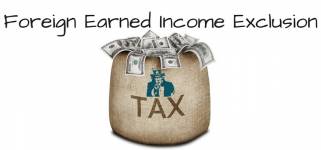Navigating life as an expat makes some of the most ordinary things a little more complicated. Moving to a foreign country doesn’t exempt you from your tax obligations. You may still be taxed on your salary, commissions, pension,social security and many other forms of income.
One of the biggest concerns that expats have is the possibility of being taxed twice – i.e. both by the U.S and the country they now call home. The Foreign Earned Income Exclusion is one of the ways to make sure that doesn’t happen, and in turn save you lots of money. If you’re an expat and learning to deal with tax season abroad, you need to know what your options are. Here are the basics on the Foreign Earned Income Exclusion.
How does it work?
The Foreign Earned Income Exclusion is an IRS provision that allows you to exclude a certain amount of your foreign-earned income from U.S tax. The exclusion amount differs from tax year to tax year. For 2019, the maximum exclusion amount is $105,900.This means that if, for example, you earn $120,000 in that tax year, and you can exclude a maximum of $105,900 from your U.S tax using the Foreign Earned Income Exclusion. Therefore, only $14,100 will be taxable by the U.S. However, expats who rent their home abroad may be able to exclude this too by claiming the Foreign Housing Exclusion.
It’s important to remember that only foreign-earned income can be excluded in this manner. Foreign earned income is defined as income earned when the expat was abroad when they earned it.

In order to exclude foreign-earned income from U.S tax, you will need to meet either the Physical Presence Test or the Bona Fide Residence Test. To meet the Physical Presence Test, you have to have been physically present in a foreign country for 330 full days in 12 consecutive months. And in order to meet Bona Fide Residence Test, you’ll have to prove that you were living in a foreign country fin the tax year.
When the Foreign Earned Income Exclusion is Not Applicable
The IRS also lists items that are not considered foreign-earned income, and therefore cannot be excluded. Some of them are:
- Meal and lodging expenses borne for your employer’s convenience that aren’t included in your income;
- Any earnings received as an employee of the U.S government;
- Reimbursements for expenses incurred on behalf of your employer under ‘an accountable plan’.
It’s important for all expats to note that whether or not you decide to offset the tax you pay on your foreign-earned income, you will be obligated to file for U.S tax if you are a U.S citizen and your income is above IRS thresholds (which start at just $5 for expats who file separately from their spouse, such as many expats married to a foreigner). In fact, you can only claim the Foreign Earned Income Exclusion by filing a tax return. A tax preparation service for expats is a great way to stay tax compliant without worrying about making mistakes or, even worse, forgetting to get it done. Expats who use a tax preparation service can rest easy knowing that they’re covered and they don’t have to worry about the nitty gritty of filing tax returns.

เข้าสู่ระบบเพื่อแสดงความคิดเห็น
Log in